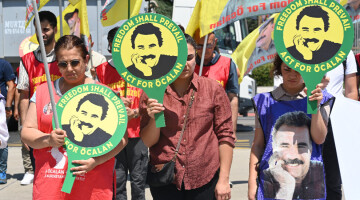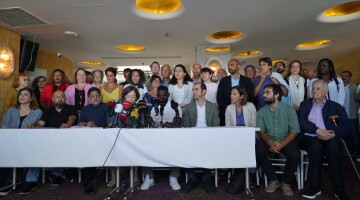The Swiss judiciary has refused to extradite an alleged "PKK cadre" to Germany. The reasoning of the Federal Criminal Court in Bellinzona (FN: RR .2020.39) on Thursday, which is likely to be a belly landing for the German prosecuting authorities, states that there is a lack of criminal liability. The latter accuses the Kurd with Turkish citizenship, who is not mentioned by name, of having been active in Germany from June 2014 to September 2014 as a "full cadre of a terrorist organization abroad" (§§129a/b StGB), meaning the PKK. From August 2015 to March 2016, he is alleged to have transferred his activities - "the recruitment of young supporters for the PKK or for the People's Defence Forces HPG" - to Belgium and France. On 1 November 2019, the accused was arrested at Zurich airport on the basis of a warrant issued by the Higher Regional Court (OLG) of Stuttgart and subsequently jailed. Two months later, the Swiss Federal Office of Justice approved the man's extradition to Germany. The person concerned successfully appealed to the Federal Criminal Court against this decision. In early May, his release was ordered.
PKK not prohibited in Switzerland
In order for the general activities of the complainant described in the extradition request in his role as an alleged cadre member of the PKK to be punishable under Swiss law, the PKK itself would have to be qualified as a "criminal organisation". In contrast to terrorist organisations such as Al-Qaeda and the ISIS, Switzerland has not yet enacted any law banning the PKK as such.
The judges dealt extensively with the background of the Kurdish question and the conflicts around Kurdistan. According to the judgement, “the foundation of the PKK was a reaction to the suppression of Kurdish identity by the Turkish state". "From 1984, it fought violently for an independent Kurdish state and later, after abandoning this goal, for the cultural rights of the Kurds. These objectives do not make the PKK appear as an organisation whose primary or predominant purpose is to commit violent crimes. Although the PKK is repeatedly associated with violent crimes by the "sub-organisations affiliated to it", its objectives make it appear more as a "political party or as a resistance and independence movement than as a criminal organisation". It should be noted in this context that concerns pursued by the PKK also met with the understanding of the Swiss authorities in principle.
Standard programme undifferentiated allegations
The fact that particularly an investigative zeal against the Kurdish freedom movement is excessively anchored in the judicial authorities in the south of the Federal Republic of Germany, is made clear by the contradictory accusations to which the judges in Bellinzona refer: "As regards the recruitment of fighters for the armed struggle, which the complainant is accused of, the request for the extradition of a Kurdish prisoner of conscience can be accused of being unlawful; that on 27 July 2014, he had called for participation in the resistance against the ISIS in the parts of Syria (Rojava/Kobane) claimed by the Kurds. As a result, six young men from the “Z.” area left for Turkey to travel from there to the battle areas in Syria. Three other events mentioned in the request were apparently also thematically dedicated to the resistance of the Kurds against the ISIS in Syria and Iraq (namely in the city of Sinjar). (...) On the basis of these statements, it emerges that the complainant is not alleged to have recruited fighters for the fight against the Turkish state in Turkey, but apparently for the Kurds' fight against the ISIS in Syria and Iraq. Moreover, a recruitment of fighters for the fight against the Turkish state would be unlikely in the period of interest here (June to September 2014), given that the PKK participated in the Turkish peace process during precisely this period, at the beginning of which the PKK leader Abdullah Öcalan had called on PKK fighters to lay down their arms. This peace process was declared terminated in July 2015. Against this background, it would appear premature to regard the mere reference to the recruitment of fighters for the armed struggle of the HPG in Syria and Iraq as support for a criminal organisation. In the following, therefore, the historical and international law-humanitarian context of the conflicts in question in Syria and Iraq are first to be discussed.”
Court: PKK recruited fighters for the defence of Rojava
The findings of the Swiss Federal Criminal Court must be devastating for all the "experts" in the local judicial authorities whose agenda includes the criminalisation of the Kurdish resistance. The judges state that: "Both the statements in the extradition request itself and the historical context described above confirm that the complainant did not recruit fighters in the “Z.” area for the HPG in 2014 in the course of his work for the PKK, so that they subsequently carried out attacks against military, state and civilian targets in Turkey. On the one hand, the extradition request itself does not make any such claims. Moreover, such an accusation would also appear to be excluded against the background of contemporary history described above. Rather, the PKK and the HPG as its armed wing in 2014 - following the YPG's call for a general mobilization for the defense of Rojava - recruited fighters who supported the YPG in the fight against the attacks of the ISIS on the Kurdish populated areas in Syria, but also in Iraq. The recruitment of fighters here was thus in favour of a civil war party in the context of a military conflict. The main purpose of this support was not to carry out attacks against the civilian population within the framework of a conflict with the Turkish state and thus intimidate them, but to protect the Kurdish civilian population in Syria and Iraq against the attacks of the ISIS and thus to protect them from expulsion, kidnapping, rape, enslavement, execution and oppression, as the population of Sinjar, for example, has been suffering since August 2014.”
The judges in Bellinzona also awarded the victim compensation in the amount of 2,000 Swiss francs, or about 1,840 euros. Whether the ruling of the Federal Criminal Court in Switzerland opens up new perspectives and approaches in the local investigating authorities remains to be doubted, however.












